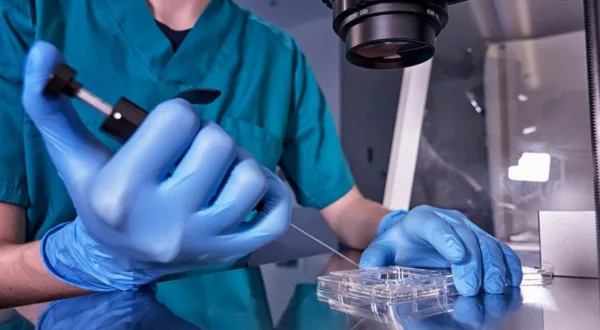
Fertility treatment advocates have expressed concerns about a new Arkansas law they say is meant to cast doubt on the effectiveness of assisted reproductive technology, even though the law does not penalize or prohibit such treatments.
Act 859 of 2025, the Reproductive Empowerment and Support Through Optimal Restoration (RESTORE) Act, is “groundbreaking legislation that champions reproductive healthcare for women in Arkansas by prioritizing restorative reproductive medicine,” the conservative group Heritage Action for America said in an April news release.
The law defines “restorative reproductive medicine” as “a scientific approach that seeks to cooperate with or restore the normal physiology and anatomy of the human reproductive system without the use of methods that are inherently suppressive, circumventive or destructive to natural human functions.”
Restorative reproductive medicine includes ultrasounds, blood tests, hormone measurements, exploratory surgeries, “natural procreative technology” and “fertility awareness-based methods,” among other things, according to Act 859.
The law goes into effect in August and requires Arkansas insurance companies to cover restorative reproductive medicine. This includes the Medicaid expansion program, Elizabeth Pitman, director of the Division of Medical Services for Arkansas Medicaid, told the House Public Health, Welfare and Labor Committee in March.
The RESTORE Act’s sponsor, Heber Springs Republican Rep. Alyssa Brown, said at the same committee meeting that restorative reproductive medicine is not only more affordable than assisted reproductive technology such as in vitro fertilization (IVF) but also is “less abrasive on the body and has higher success rates.”
“I want to be clear: This doesn’t limit anyone’s ability to access IVF,” said Brown, who did not respond to the Advocate’s requests for comment.
Brown’s statement was true, but Act 859 is still cause for concern, said Dr. Dean Moutos, an obstetrician-gynecologist at Little Rock’s Arkansas Fertility and Gynecology Associates. The clinic’s website includes a header that warns prospective patients against restorative reproductive medicine, saying it’s “not a medically proven alternative to IVF.”
is a backhanded attack on assisted reproductive technology in my view, not because of what they say, but because of what they clearly omit” by not including proven methods such as IVF in discussions of fertility treatments, Moutos said in an interview.
Dr. Dean Moutos, OB/GYN (Courtesy photo/Arkansas Fertility and Gynecology Associates)
He disputed the claim that assisted reproductive technologies are “suppressive” as supporters of restorative reproductive medicine claim.
“When they talk about natural procreation, restoring nature and all this other stuff, that’s great, but the patients I’ve seen have already tried that and it hasn’t worked,” Moutos said.
Similarly, the IVF advocacy group Resolve: The National Infertility Association is concerned that the rhetoric surrounding restorative reproductive medicine frames it as a necessary “first step before IVF,” and this could “take some of the autonomy from the patient,” Resolve Director of Government Affairs Alise Powell said in an interview.
“It’s concerning that folks are trying to deprioritize something that is evidence-based in favor of something that folks are already doing in order to prepare themselves on their fertility journey,” Powell said.
The American Society for Reproductive Medicine, which advocates for physicians that practice reproductive health care and fertility treatments, said restorative reproductive medicine “is not medical practice but ideology.”
“Its proponents create a false narrative that standard fertility care skips proper diagnosis or healing, when in fact, it is based on precisely those principles,” the organization stated.
Moutos said he was not surprised that assisted reproductive technology has come under conservative scrutiny in the three years since the U.S. Supreme Court overturned Roe v. Wade and left abortion access up to the states. Arkansas has one of the nation’s most restrictive abortion bans, with a narrow exception to save the life of the pregnant individual.
IVF providers in Alabama, which also has one of the most restrictive abortion bans, temporarily halted operations in response to a February 2024 state Supreme Court ruling that frozen embryos are children and if destroyed, a wrongful death lawsuit could be filed. State lawmakers later passed legislation providing criminal and civil protections for IVF clinics.
Republican President Donald Trump, who called himself the “father of IVF” on the campaign trail last year, issued an executive order earlier this year directing policy advisers to create a report on how to make in vitro fertilization more accessible for Americans.
WebReadyTM Powered by WireReady® NSI










